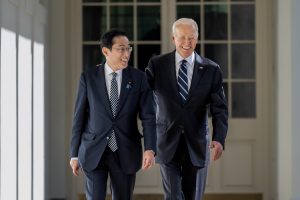Ahead of the 2016 U.S. presidential elections, the Japanese embassy in the United States was most likely expecting a victory for the Democratic Party’s former Secretary of State Hillary Clinton, but it seems they also kept in touch with the campaign of Republican candidate Donald Trump. As such, the embassy was able to contact Trump immediately after the results of the election were announced, facilitating a meeting with then-Japanese Prime Minister Abe Shinzo before Trump’s inauguration.
Subsequently, in both 2020 and 2024, the embassy has naturally maintained contact with both parties, ready to act irrespective of which candidate wins. One would expect other countries to be doing something similar. For Japan’s part, it seems to be focusing on the topic of a Japan-U.S. relationship that will remain unchanged no matter who wins in 2024.
For instance, we have former Prime Minister Kishida Fumio’s speech to the U.S. Congress on April 11. There, he said, “Although the world looks to your leadership, the U.S. should not be expected to do it all, unaided and on your own.” He praised the leadership of the United States and said of Japan, “as the United States’ closest friend, tomodachi, the people of Japan are with you, side by side, to assure the survival of liberty. Not just for our people, but for all people.”
Kishida added, “I am here to say that Japan is already standing shoulder to shoulder with the United States. You are not alone.” He emphasized an image of Japan as standing right next to the United States, framed the future of the Japan-U.S. alliance as “Global Partners for the Future,” and called for the building of a relationship that persists regardless of who becomes president.
In the July 2024 Japan-U.S. 2+2 Joint Statement, four ministers from both countries affirmed that “the enduring U.S. and Japanese commitment to stand shoulder-to-shoulder in upholding and protecting the free and open international order based on the rule of law” while “Recognizing the profound level of global threats to our Alliance’s shared vision and common values.” Of note is the use of the word “enduring” and specifying that Japan and the United States share a sense of crisis and are going to deal with the challenges together.
Moreover, the ministers reaffirmed “their intent to implement new strategic initiatives following Prime Minister Kishida’s historic Official Visit with State Dinner on April 10, with the vision to build a global partnership for the future [emphasis added], including upgrading Alliance command and control (C2), deepening defense industry and advanced technology cooperation, and enhancing cross-domain operations.” Words such as “enduring” and “for the future” have often featured in discourse between Japan and the United States in recent years, apparently in the hope that the Japan-U.S. alliance will not falter regardless of the outcome of U.S. elections.
In addition to this language, new initiatives are underway between Japan and the United States even in the final year of the Biden administration. One has been the first Japan-U.S. Strategic Diplomacy and Development Dialogue, which was held at the end of May 2024. This meeting served to bring together the vice minister for foreign affairs of Japan and the deputy secretary of state of the United States, and it appears that the expectation is that it will be held in the future as well. The statement issued after the first meeting emphasized that “During Prime Minister Kishida’s official visit to the U.S in April, Japan and the U.S. confirmed that they have become global partners, whose cooperation extends beyond the bilateral relationship and the surrounding region, to uphold and bolster the free and open international order based on the rule of law.”
At these meetings, the two sides are set to discuss “a wide range of topics from a strategic perspective, including how Japan and the United States can address and coordinate for issues facing the two countries and the international community and how both countries can strengthen their engagement with countries of the Global South.” This will be a forum to discuss how to cooperate in reaching out to the countries of the so-called Global South, but it will not be a means by which the two countries are to act in unison. Rather, it will likely be a place for “strategic” dialogue, where Japan and the United States leverage their respective strengths to conduct diplomacy under a shared philosophy and direction.
Through these actions, Japan appears to be trying to build an enduring relationship with the United States that is unaffected by the outcome of the U.S. presidential election. Will this diplomatic approach be effective? We will find out after January 2025.

































